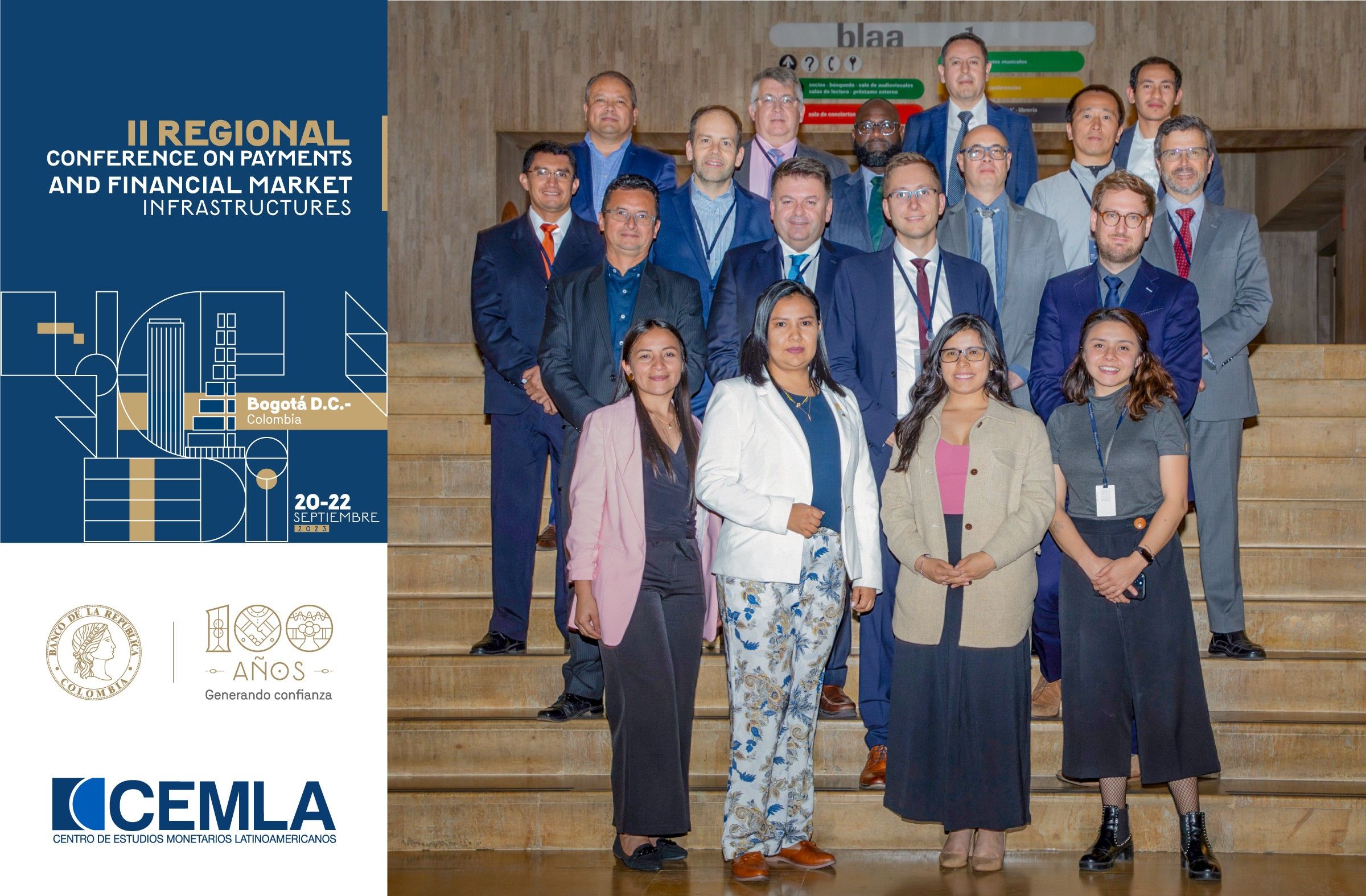

Disponible en
Español
![]()
II Regional Conference on Payments and Financial Market Infrastructures
September 20 - 22, 2023
Bogotá, Colombia
The II Regional Conference on Payments and Financial Market Infrastructures, organized by the Directorate of Financial Market Infrastructures of CEMLA in collaboration with the Central Bank of Colombia, took place in a hybrid format from September 20 to 22, 2023, in Bogotá, Colombia. The conference witnessed the participation of 141 representatives from 35 CEMLA institutions and partners, representing 25 countries. The conference aimed to assemble practitioners, academics, and stakeholders to engage in discussions concerning the latest research and policy advancements pertinent to payment systems and financial infrastructures. The focus was on contextualizing these discussions within the landscape of financial technologies and other pivotal contemporary innovations.
The three-day event commenced each morning with a keynote address, followed by two distinct sessions dedicated to participant presentations and discussions.
The opening day commenced with warm greetings from Manuel Ramos-Francia, CEMLA's Director General, and opening remarks by Bibiana Taboada Arango, a member of the board of directors at Banco de la República. Hanna Halaburda delivered the keynote speech. The first session, "Adoption and pricing in retail payment systems" showcased Carlos Cantú's paper on "Adoption of fast digital payments and effects on banking systems: the case of Costa Rica’s SINPE móvil" (BIS), followed by Yang Ji's exploration of "The Rise of E-Wallets and Buy-Now-Pay-Later: Payment Competition, Credit Expansion, and Consumer Behavior" (Xiamen University). José Aurazo presented "Interchange fees, access pricing, and sub-acquirers in payment cards" (Central Reserve Bank of Perú) to close the session. The subsequent session, "Oversight, measurement, and efficiency in Financial Market Infrastructures" featured works by Constanza Martínez on "Redundancy of Centrality Measures in Financial Market Infrastructures" (Banco de la República Colombia), Ajit Desai's "Machine Learning Framework for Pattern Recognition and Anomaly Detection in Payments Systems" (Bank of Canada), Marc Glowka's "The Hierarchy of Critical Participants: A Clustering Approach utilizing network-based Indicators" (Deutsche Bundesbank), and Wenqian Huang's "DeFi Leverage" (BIS).
The second day, due to unforeseen circumstances, commenced with Franz Seitz presenting "Uncertainty, politics, and crises: The case for cash" (TH-Wildau). Hyun-Song Shin from the BIS followed with the keynote address. The session "CBDC and the future of money" saw Constantin Drott explore "Empowering central bank money for a digital future" (Deutsche Bundesbank), Chevano Baker's presentation on "Central Bank Digital Currencies: An opportunity to improve financial inclusion in Jamaica" (University of Bristol), and Manmohan Singh's discussion of "Seigniorage and Currency-in-Circulation (in a digital era)" (IMF). The subsequent session, "Financial infrastructures and market risks," included presentations on "The Transmission of Non-Banking Liquidity Shocks to the Banking Sector", "The drivers of systemic risk of the CALL and REPO Argentinian Interbank Markets", "Joint determination of Counterparty and Liquidity Risk in Payment Systems", and "Residual Risk and Default Waterfalls in Central Counterparties" by Miguel Sarmiento (Banco de la República), Deborah Noguera (Universidad de la Plata), Gabriel Rodriguez (McGill University), and Jorge Cruz (University of Western Ontario) respectively.
On the final day, the session "The real economy, networks, and payments" featured Biliana Alexandrova's "A forecast model to predict the Mexican economic activity based on payment information" (Banco de México), Michel Alexandre's "Labor market and systemic risk: a network-based approach" (Central Bank of Brazil), and Santiago Carbó-Valverde's "Mobility restrictions and payment choices: the case of the Covid-19 pandemic" (University of Valencia). Fernando Alvarez delivered the keynote speech. The concluding session, "Policy issues in payments: DeFi and public provision of means of payment" showcased works by Franz Seitz, Carlos Castro-Iragorri's "Network topology in Decentralized Finance" (Universidad del Rosario), Heng Chen's "How Far Do Canadians Need to Travel to Access Cash?" (Bank of Canada), and Carlos Arango-Arango's "A Mixed Duopoly in Interbank Payment Services" (Banco de la República).

